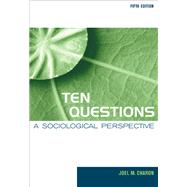
What is included with this book?
| Preface | ix | ||||
| Introduction | 1 | (7) | |||
| 1 How Do Sociologists Study Society? | 8 | (21) | |||
|
|||||
|
10 | (1) | |||
|
10 | (10) | |||
|
20 | (3) | |||
|
23 | (1) | |||
|
24 | (1) | |||
|
25 | (1) | |||
|
26 | (3) | |||
| 2 What Does It Mean to Be Human? | 29 | (19) | |||
|
|||||
|
31 | (9) | |||
|
40 | (3) | |||
|
43 | (1) | |||
|
44 | (1) | |||
|
45 | (1) | |||
|
45 | (3) | |||
| 3 How Is Society Possible? | 48 | (29) | |||
|
|||||
|
49 | (3) | |||
|
52 | (3) | |||
|
55 | (9) | |||
|
64 | (3) | |||
|
67 | (3) | |||
|
70 | (1) | |||
|
71 | (1) | |||
|
71 | (6) | |||
| 4 Why Are People Unequal in Society? | 77 | (32) | |||
|
|||||
|
77 | (3) | |||
|
80 | (9) | |||
|
89 | (11) | |||
|
100 | (1) | |||
|
101 | (1) | |||
|
102 | (7) | |||
| 5 Are Human Beings Free? | 109 | (40) | |||
|
|||||
|
111 | (5) | |||
|
116 | (13) | |||
|
129 | (8) | |||
|
137 | (3) | |||
|
140 | (2) | |||
|
142 | (1) | |||
|
143 | (6) | |||
| 6 Why Can't Everyone Be Just Like Us? | 149 | (25) | |||
|
|||||
|
150 | (2) | |||
|
152 | (2) | |||
|
154 | (2) | |||
|
156 | (6) | |||
|
162 | (4) | |||
|
166 | (2) | |||
|
168 | (1) | |||
|
168 | (6) | |||
| 7 Why Is There Misery in the World? | 174 | (38) | |||
|
|||||
|
179 | (10) | |||
|
189 | (4) | |||
|
193 | (3) | |||
|
196 | (5) | |||
|
201 | (2) | |||
|
203 | (1) | |||
|
204 | (8) | |||
| 8 Does the Individual Really Make a Difference? | 212 | (31) | |||
|
|||||
|
213 | (1) | |||
|
214 | (4) | |||
|
218 | (7) | |||
|
225 | (9) | |||
|
234 | (2) | |||
|
236 | (1) | |||
|
237 | (1) | |||
|
237 | (6) | |||
| 9 Is Organized Religion Necessary for Society? | 243 | (41) | |||
|
|||||
|
244 | (6) | |||
|
250 | (13) | |||
|
263 | (13) | |||
|
276 | (2) | |||
|
278 | (1) | |||
|
279 | (5) | |||
| 10 Is Sociology Important? | 284 | (14) | |||
|
|||||
|
284 | (1) | |||
|
285 | (8) | |||
|
293 | (1) | |||
|
294 | (1) | |||
|
294 | (4) | |||
| Afterword Should We Generalize About People? | 298 | (21) | |||
|
299 | (5) | |||
|
304 | (4) | |||
|
308 | (5) | |||
|
313 | (3) | |||
|
316 | (1) | |||
|
316 | (3) | |||
| Glossary | 319 | (19) | |||
| Index | 338 |
The New copy of this book will include any supplemental materials advertised. Please check the title of the book to determine if it should include any access cards, study guides, lab manuals, CDs, etc.
The Used, Rental and eBook copies of this book are not guaranteed to include any supplemental materials. Typically, only the book itself is included. This is true even if the title states it includes any access cards, study guides, lab manuals, CDs, etc.